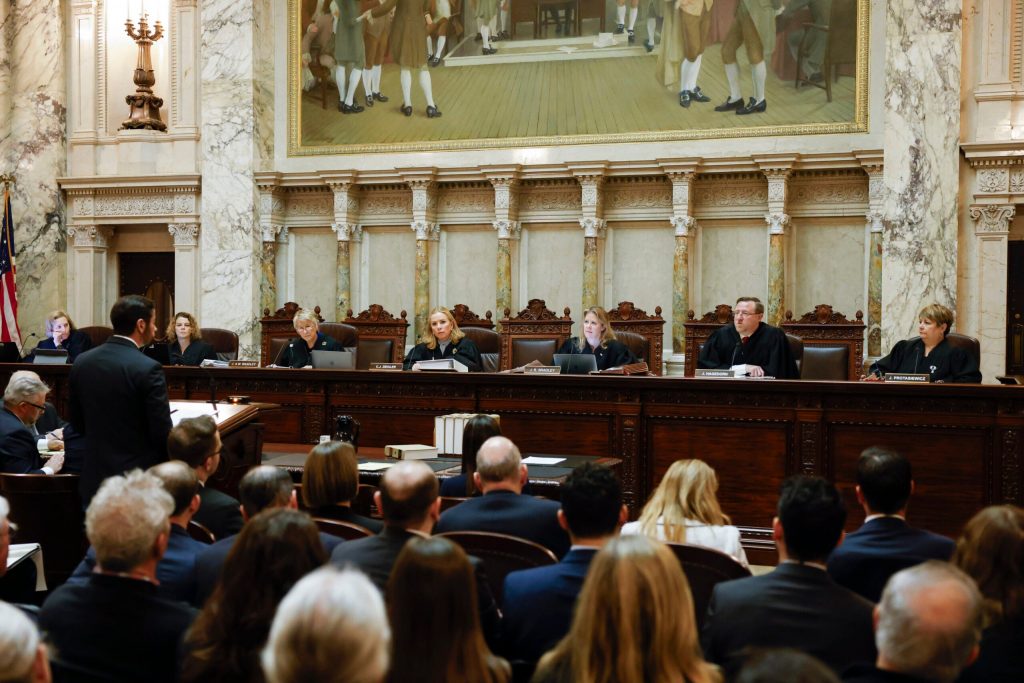WI Supreme Court Considers Suit to Remap Congressional Districts
Appoints 3-judge panels to consider: must map with 6-2 Republican split be redrawn?

The interior of the Wisconsin State Capitol on Monday, July 14, 2025, in Madison, Wis. Angela Major/WPR
The Wisconsin Supreme Court has appointed judicial panels to hear two lawsuits challenging the state’s congressional districts, a move that could lead to the Republican-leaning map being redrawn ahead of the 2026 midterms.
In two orders issued Tuesday, justices established separate three-judge panels to hear the cases, implementing a process that was created by Republicans 14 years ago.
It’s a process that’s never been used, and until Tuesday’s orders, it was unclear whether justices would turn to it here. While the court has a 4-3 liberal majority, it has declined to hear other challenges to Wisconsin’s congressional map.
Plaintiffs in these cases, however, argued the court had no choice to set those wheels in motion once their lawsuits were filed, and the court’s liberal majority agreed. Each complaint, justices wrote, constituted an “action to challenge the apportionment of a congressional or state legislative district” under the law.
“This court is required to appoint a three-judge panel,” the court’s majority wrote.
Two of the court’s conservatives — Justices Annette Ziegler and Rebecca Bradley — dissented, accusing their liberal colleagues of working to deliver partisan, political advantage to Democrats.
“Today, my colleagues—disregarding the United States Constitution, the Wisconsin Constitution, and fundamental legal principles—approve a collateral attack of our court’s decision by a panel of circuit court judges, unsupported in the law,” wrote Ziegler.
“The members of this court, however, swore an oath to uphold the Wisconsin Constitution, which prohibits lower courts from reconsidering decisions of this supreme court,” Bradley wrote.
Conservative Justice Brian Hagedorn, who was frequently a swing vote before liberals captured a majority two years ago, concurred with part of the order, saying he believes the law requires the creation of the panels. But he objected to the way judges were chosen by the majority, saying they should have been chosen randomly.
“I am not suggesting the judicial panel will fail to do its job with integrity and impartiality,” Hagedorn wrote. “But this approach is an odd choice in the face of a statute so clearly designed to deter litigants from selecting their preferred venue and judge.”

The Wisconsin Supreme Court listens to arguments from Wisconsin Assistant Attorney General Anthony D. Russomanno, who is representing Gov. Tony Evers, in a redistricting hearing at the Wisconsin state Capitol Building in Madison, Wis., on Tuesday, Nov. 21, 2023. Ruthie Hauge/The Capital Times via AP
Judges from Dane, Milwaukee, Marathon, Portage and Outagamie counties will hear cases
As it stands, a lawsuit brought by Wisconsin Business Leader for Democracy will be heard by Dane County Judge David Conway, Portage County Judge Patricia Baker and Marathon County Judge Michael Moran. The other lawsuit, brought by a group of Democratic voters, will be heard by Dane County Judge Julie Genovese, Milwaukee County Judge Mark Sanders and Outagamie County Judge Emily Lonergan.
The Dane County judges were included in both cases because they handled the original lawsuits when they were filed.
“Had stuff started moving more quickly, it would have been more conceivable to have maps in place,” Godar said. “I don’t think it’s impossible at this point depending on how quickly the panels act, but … it will be a tight timeline.”
In separate orders, two of the court’s liberals — Justices Janet Protasiewicz and Susan Crawford — declined requests from Republicans to step aside in the cases. As candidates for the court, both discussed redistricting, but they said their remarks gave no indication of how they would rule in these cases.
The court’s liberal majority previously heard a challenge to Wisconsin’s Republican-drawn state legislative maps, striking them down as unconstitutional in December 2023. Under pressure from the court, the Republican-controlled Legislature then passed new maps that had been drawn by Democratic Gov. Tony Evers. Those maps helped Democrats win seats in the 2024 election and give them a chance at winning majorities in both chambers of the Legislature in 2026.
Democrats have tried to get the court to do the same with Wisconsin’s congressional map, arguing in a state with 50-50 elections, both parties should have realistic shots at winning seats in Congress, rather than the 6-2 GOP split that exists today.
Editor’s note: WPR’s Rich Kremer contributed reporting.
Wisconsin congressional map lawsuits move forward as state Supreme Court appoints panels was originally published by Wisconsin Public Radio.
If you think stories like this are important, become a member of Urban Milwaukee and help support real, independent journalism. Plus you get some cool added benefits.





















Reublican M.O. “If You can’t win by hook, win by crook”.
Rigging Voting Districts is Voter Fraud.
U.S. Congresssional Districts remain Rigged. VOTE November 2026
Note: WI Stare Supreme Court ruled Legislative Rigged Maps are Unconditional.